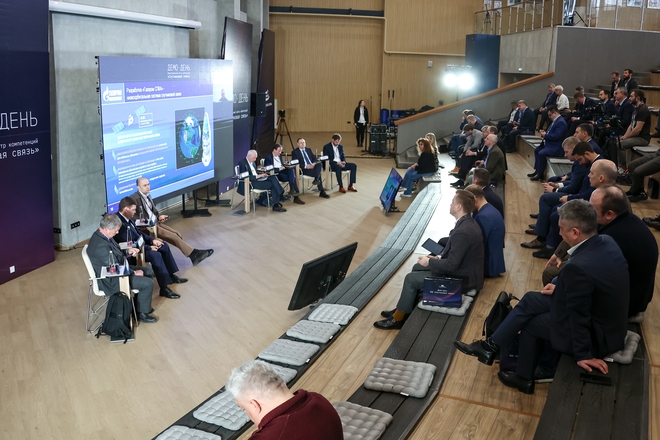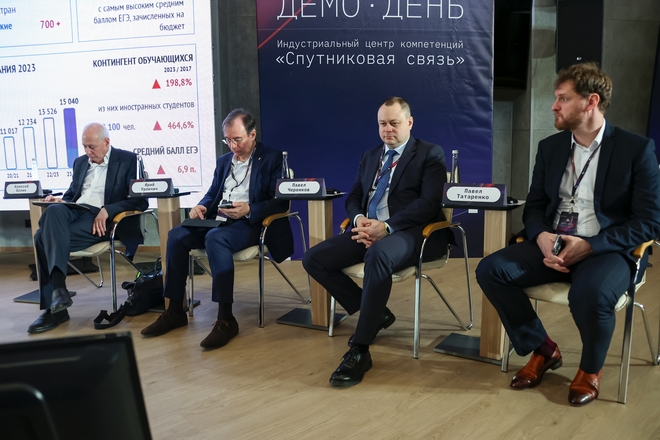Center of satellite power: the top companies in the Russian space communications market summed up the results of their work at the Demo Day of the ICC "Satellite Communications"
Because of sanctions and the refusal of foreign companies to cooperate with partners from Russia, the question arose of creating many domestic satellite solutions from scratch and building fundamentally new cooperation. Russian enterprises have successfully coped with this task, said Alexey Volin, General Director of RSCC, at a meeting with industry representatives within the framework of the Demo Day of the ICC "Satellite Communications" in Veliky Novgorod.
"In 2022, we signed a contract with RESHETNEV JSC for the production of the first fully domestic telecommunications spacecraft Express-AMU4. Its service area includes Europe, America, and Africa, which is a good export solution that will allow Russia to maintain its position in foreign markets. However, development of the satellite would have been impossible without cooperation: to date, about 30 Russian contractors are involved in this process. And in 2024, it is planned to begin the assembly of the device at RESHETNEV JSC," said the General Director of RSCC at the plenary session of the Demo Day. In general, the company plans to replace seven existing spacecraft in orbit by 2030.
In addition, within the framework of promising cooperation between RSCC and partners, devices for transmitting high-precision corrections are being created: they can be used on land and on water.
"Last year, an agreement was signed with GLONASS JSC at SPIEF, and our colleagues from NPP ACC JSC designed a special receiving device, which is currently being tested on agricultural machinery. In 2024, we plan to transfer the use of precise point positioning from land to sea: together with Morinzhgeologiya LLC, we intend to test the equipment in marine conditions," Alexey Volin added.
Yuri Urlichich, Chairman of the Council of the Association of Satellite Communications Market Players, Adviser to Director General of RSCC also emphasized the need to integrate various solutions. He was a moderator of the plenary session of the event.
"We need to create our own devices and software, as well as organize cooperation of competitive space systems, establish interaction between industry representatives. It is important for us now not only to provide communication from anywhere in the world, but also to look towards smartphone-satellite technology, the Internet of Things, quantum and laser technologies. Then we will have a sustainable development of the industry and all telecommunications services," Yuriy Urlichich said.
In turn, Pavel Tatarenko, Deputy Chairman of the ICC "Satellite Communications", IT-Director at RSCC, told how the company shares its own solutions with other market players.
"At the moment, we are attracting a fairly wide range of enterprises that, together with us, are engaged in algorithm reengineering process and software development based on the domestic Astra operating system. RSCC also plans to offer new products on the market that can simplify and reduce the cost of operation of ground equipment and spacecraft," Pavel Tatarenko summed up.
ICC "Satellite Communications" has become a significant platform for establishing joint activities, Director of the Department of State Regulation of the Telecommunications Market of the Ministry of Finance of Russia, is confident.
"The Industrial Competence Center is a platform based on anchor customers. Trends, new projects and promising areas for the development of the IT landscape are being formed within the framework of the ICC. Work in these areas does not stop," he said.
The activities of the new Gazprom AIT Facility will also be built in cooperation with a number of Russian companies.
"At the moment, we are participating in the implementation of the roadmap approved at the meeting of the government commission. According to it, we must build three space systems. I would like to note that we do not have metalworking, there is no production of devices. Therefore, here we are counting on our colleagues, Russian enterprises, that will supply us with devices," said Andrey Yakovlev, Chief Designer and head of the design bureau of the Gazprom AIT Facility. He added that the production capacity of the new plant is four heavy or up to 100 small satellites per year.
Another spacecraft manufacturer, RESHETNEV JSC, is also aimed at interacting with partners.
"Today, our main task is to develop our cooperation in producing the equipment that is needed for the creation of spacecraft. Regarding platforms, everything is quite good: they have been import-independent for a long time, and we can make satellites fast and at minimal cost. As for the payload, we have cooperation in matters of all equipment, and we plan to deepen it further, involving even more industrial enterprises in this process," said Yuri Vilkov, Deputy General Director for Development and Innovation of RESHETNEV JSC.
During the plenary session, Pavel Cherenkov, General Director of JSC Gonets Satellite System, told what is being done within the framework of "Sfera" program. Roscosmos has named Gonets as the operator of all new constellations included in the project. Tt is referred to "Gonets", "Express RV", "Skif" and "Marathon IoT".
"Now Roscosmos has issued documents that allow us, as the operator of the "Sfera" project, to sign legally important agreements and begin physical work on the places. Over the past year, we have made good progress in terms of the necessary measures within the framework of "Sfera", he noted.
According to Sergey Plugotarenko, CEO of ANO Digital Economy, a project office has been formed on the basis of the organization to support roadmaps and exchange best practices between experts from different fields.
"Thanks to it and its interaction with the ICC, development companies, relevant committees and public authorities, we have learned how to collect expertise. The Technical Leadership Center was also formed last year. On this site, we are already aggregating breakthrough solutions, posting industry analytics, analyzing the export potential of software, etc. The plans include the promotion of technological leaders and the very concept of technical leadership, the growth of integration between various ICC," he said.
The Russian Information Technology Development Fund also uses Industrial Competence Centers as platforms for selecting and financing projects. According to Alexander Pavlov, Director General of the RFRIT, 22 particularly significant initiatives have recently been supported for a total cost of 24 billion rubles.
"Since 2022, on behalf of the government, we have been working with help of Industrial Competence Centers. Now a number of programs have already been completed, and replication is underway by industry. Next is the introduction of solutions to foreign markets, because this was the task from the beginning. We will be glad if we receive projects in the field of satellite communications during the new wave of selection process, because this is one of the key areas," Alexander Pavlov stressed.
At the same time, Mikhail Korablev, Chief Designer of GLONASS JSC, spoke about the results of the company's activities and plans for the next 7 years.
"Currently, more than 10 million cars are equipped with the ERA-GLONASS system, and the total fleet of cars in the Russian Federation is 55 million. In 5-7 years, most of the cars will be equipped with our service. We have also resolved the issue of installing the system on all small vessels in Russia, light unmanned vessels. Additionally, we solve the problem of personal security: this applies to tourists, hunters, sailors, etc. In fact, GLONASS is becoming a single service for transmitting emergency calls, regardless of whether a person is on some kind of transport or walking," Mikhail Korablev summed up.
During session 1, at the Demo Day of the ICC, experts discussed precise point positioning technology, a conditional access system, as well as a satellite automatic identification system (AIS). Evgeny Buidinov, Deputy Director General of RSCC, moderated the discussion. At session 2, the speakers talked about the formation of the domestic IT landscape, VSAT platforms and the creation of innovative antennas. Pavel Tatarenko, Deputy Chairman of the ICC "Satellite Communications", IT-Director of RSCC, moderated this discussion.



